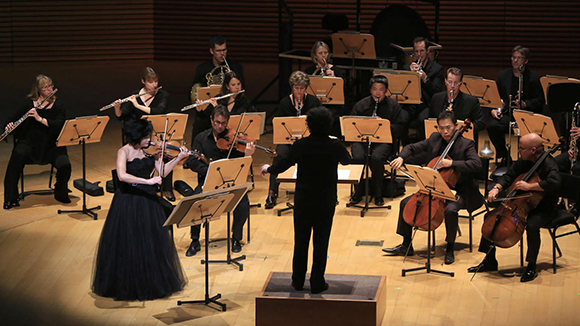Los Angeles Times
By Mark Swed
March 11, 2015
original
link
L.A. Phil covers lusty Modern Italian with gusto

Gustavo Dudamel conducts a Green Umbrella program performance of a small violin concerto, "Anahit" by Giacinto Scelsi featuring Jennifer Koh, left. (Glenn Koenig / Los Angeles Times)
Late 20th century Italian Modernism has gone mainstream in furniture design, architecture, cuisine and elsewhere. This was also a golden age for modern music, one that has had and continues to assert considerable international influence. But we pay it too scant attention.
The Los Angeles Philharmonic's Green Umbrella program Tuesday night offered a compelling corrective. On the one hand, a concert by the orchestra's New Music Group of uncompromising works by Luigi Nono, Luca Francesconi, Luciano Berio and Giacinto Scelsi might seem a somewhat opaque blast from the Green Umbrella past, especially the Esa-Pekka Salonen years, when hardcore new music was more common on the series. Salonen himself studied in Milan.
But Gustavo Dudamel stepped up to the avant-garde Italian plate on this occasion in inspired performances of two seemingly arcane works. Berio's "Calmo," a curiously obscure memorial to Italian composer Bruno Maderna that featured Swedish mezzo-soprano Charlotte Hellekant, and Scelsi's "Anahit," a mystical violin concerto with Jennifer Koh as the soloist.
Both pieces had their origins around the same time and are by composers so unalike that an Italian Modernist musical school might seem like a meaningless notion. Berio was Milanese and from a musical family. He became Italy's most cosmopolitan avant-garde composer and had voraciously wide musical appetites.
Scelsi, born in 1905 (20 years before Berio), was an Italian aristocrat who grew up in a castle, was inspired by Eastern religions, experimented with weirdly interior microtones and rarely left his palatial apartment in Rome.
Yet these works sounded comfortable together in Walt Disney Concert Hall. Each composer had a way with the sensual, downright lusty Italian tradition that goes back centuries. Both pieces are for similar-sized ensembles with string sections that lack violins, and both last about 15 minutes.
For all his spiritual fervor, Scelsi had his earthy side. "Anahit" is dedicated to Venus. Anahit was the Armenian goddess of fertility. The concerto was written in 1965, the year of "Juliet of the Spirits," a movie stimulated by Federico Fellini's experiments with psychedelic drugs and séances.
Scelsi wanders through the same parapsychological territory. The solo violin, led on a transcendent journey by an 18-piece droning ensemble, relies on the intensity of bent tones with otherworldly implications, and Koh made every note mesmerizing. Dudamel's job was as a conveyor of eeriness, something for which he seemed peculiarly at home.
Compared with these ensemble pieces the works by Nono and Francesconi were more abstract. Italian sensuality and spirituality surfaced nonetheless.
Nono's "'Hay que caminar' sonando" for two solo violins is the composer's last work before he died in 1990, and it evokes a sense of leaving the material world. The players stand apart and are asked to move to different positions for each of the three sections.
As associate concertmasters Nathan Cole and Bing Wang moved farther and farther away from the audience, winding up in the organ loft, they created a physical sense of removal to accentuate the insubstantial sounds of their bows barely scraping strings.
Copyright ©2015 Los Angeles Times
© Jennifer Koh, All Rights Reserved. Photography by Juergen Frank. Site by ycArt design studio